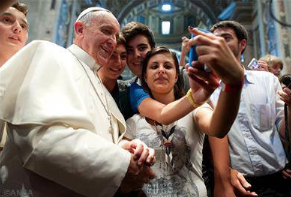 Sandro Magister skriver om hvordan pave Frans ofte (bevisst) misforstås som veldig liberal og moderne av pressen. Og så siterer han hva paven sa til de unge i Torino 21. juni:
Sandro Magister skriver om hvordan pave Frans ofte (bevisst) misforstås som veldig liberal og moderne av pressen. Og så siterer han hva paven sa til de unge i Torino 21. juni:
Even the pope must sometimes take a risk to speak the truth. Love is in works, in communicating, but love is very respectful of persons, it does not use persons, and love is chaste. And to you young people in this world, in this hedonistic world, in this world where all the publicity goes to pleasure, to fun, to the good life, I say to you: be chaste, be chaste.
All of us in life have gone through moments in which this virtue is very difficult, but this is nothing other than the way of a genuine love, of a love that knows how to give life, that does not seek to use the other for one’s own pleasure. It is a love that considers the life of the other person as sacred: I respect you, I do not want to use you. It is not easy. We all know the difficulties in overcoming this “facilistic” and hedonistic conception of love. Forgive me if I am telling you something that you were not expecting, but I ask you: make the effort to live love chastely…
We are living in a culture of the disposable. Because that which is of no economic utility is discarded. Children are discarded because they are not had or are killed before they are born; the elderly are discarded because they are not needed and are left there to die in a sort of hidden euthanasia.
Magister skriver i samme artikkel om hvordan pavens encyklika «ladato si» er gjort lettere tilgjengelig fordi den teologiske innledningen er flyttet lenger ut i brevet, men likevel er den teologiske sammenhengen og helheten tydelig med:
“The encyclical, as it is presented to us today, shows a face different from that of the first draft, which was to include a long introduction of a theological, liturgical, sacramental, and spiritual character. If the initial configuration had remained, the encyclical would have been addressed more immediately to the Catholic world. Pope Francis, instead, preferred to change this configuration, moving the theological part to the middle and end, as he also did with the parts concerning spirituality and education. In this way he restructured the material made available to him, arranging it according to a method of analysis and discernment that implies a consideration of the situation, an evaluation and a prefiguration of practical guidelines for working on a solution of the problems. He thus wanted to involve the largest possible number of readers, including nonbelievers, in a thought process that to a large extent can be shared in by all.”
Another interesting observation has come from an economist who contributed to the composition not of this encyclical but of the “Caritas in Veritate” of Benedict XVI, former IOR president Ettore Gotti Tedeschi.
In an interview with “la Repubblica” and a commentary in “Il Foglio,” he has said that the profound meaning of the encyclical can be grasped only when to “Praised may you be” is added “my Lord.” Because the ultimate cause of the behavior that leads to environmental degradation “is sin, the loss of God,” while the proximate cause “is the exaggerated consumerism induced in order to compensate for the collapse of the birth rate in Western countries.” ….

be chaste! men hvordan? Her må Kirken i Norge komme langt mer på banen. Både å snakke åpent og postivt om Kirkens seksualmoral, men også tørre å ta debatten. Slik det er nå fremstår dette som fullstendig tabu. Det er svært synd, både for oss troende og som kirke.